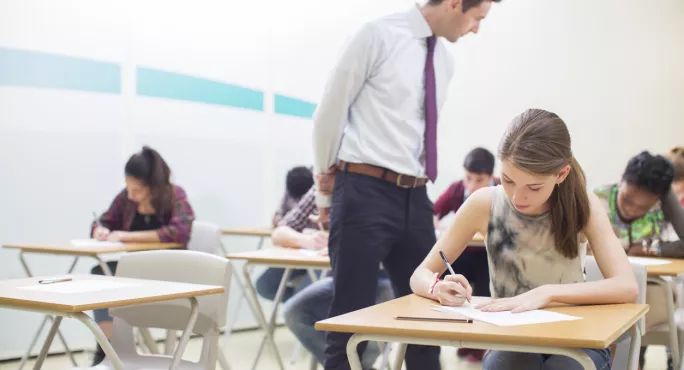Heads fear Covid-free students could miss exams

Headteachers’ leaders are “concerned” that pupils with Covid will be spreading the virus in exam halls this summer, while others without the virus will not be sitting them because of a lack of access to lateral flow tests.
A school leaders’ union has issued the warning in response to new guidance from the Joint Council for Qualifications (JCQ) on how exams should be run for pupils positive for Covid-19 or with symptoms.
It says that pupils with a high temperature should not come to school.
The update comes in its document on how the special considerations process will be applied in this year’s exam series.
It points towards guidance for under 19s from the UK Health Security Agency (UKHSA), which says children with mild symptoms, such as a runny nose, sore throat or slight cough, can continue to attend their education setting, but that those who are unwell and have a high temperature should stay at home and avoid contact with other people.
But Julie McCulloch, director of policy at the Association of School and College Leaders (ASCL), said that the lack of plans to make Covid tests available could mean students transmitting the illness to peers and invigilators, and others missing exams even though they don’t have the virus.
- Scotland: Exam grading ‘must allow for disruption faced by students’
- GCSEs 2022: Summer exams ‘likely to widen disadvantage gap’
- Related: Exam aids ‘not enough to help poorer students’
The JCQ guidance says that centre staff should, wherever possible, encourage candidates to attend their examinations, but adds: “A candidate who is staying at home and avoiding contact with others, in line with UKHSA guidance, at the time of the examination, is considered to be absent from the examination for an acceptable reason.”
It continues: “Where a candidate still wishes to attend an examination, despite having symptoms (eg, a high temperature) or a positive Covid test, the centre should encourage the candidate to follow the UKHSA’s guidance.”
The JCQ document also highlights that a young person who “has a positive Covid-19 test result should try to stay at home and avoid contact with other people for three days after the day they took the test, if they can.”
And it says that children and young people who live with someone who has a positive Covid-19 test result should continue to attend school as normal.
The guidance says that there will be no requirement for a candidate to complete a Covid test to provide evidence of their absence from an examination.
For June’s exams, the guidance adds that, due to the exceptional circumstances, the awarding bodies will award a grade where eligible candidates have completed the assessment for at least one whole component within the specification.
There are exceptions, for example, a candidate cannot receive a grade for GCSE English language by only completing the Spoken Language Endorsement.
Ms McCulloch said that the ASCL welcomed the fact that guidance had now been published, but still had concerns.
She added: ”The fact that there are no plans to make Covid tests available means that it will be impossible to tell whether or not those symptoms are actually Covid.
“As a result, we may end up with students who have Covid and are infectious in exam halls potentially transmitting the illness to other students and invigilators, and students at home who do not actually have Covid missing exams.”
She said that the “obvious” solution would be to make free tests available, in order to avoid a “guessing game”.
And concluded: “We simply cannot understand why the government does not take this obvious and sensible step, especially as it has continually said how important it thinks public exams are.”
Special consideration during exams is given to a candidate who has “temporarily experienced illness, injury or some other event outside of their control at the time of the assessment”.
It is applied when the issue or event has had, or is reasonably likely to have had, a material effect on a candidate’s ability to take an assessment or demonstrate his or her normal level of attainment in an assessment.
Register with Tes and you can read two free articles every month plus you'll have access to our range of award-winning newsletters.
Keep reading with our special offer!
You’ve reached your limit of free articles this month.
- Unlimited access to all Tes magazine content
- Save your favourite articles and gift them to your colleagues
- Exclusive subscriber-only stories
- Over 200,000 archived articles
- Unlimited access to all Tes magazine content
- Save your favourite articles and gift them to your colleagues
- Exclusive subscriber-only stories
- Over 200,000 archived articles
topics in this article



